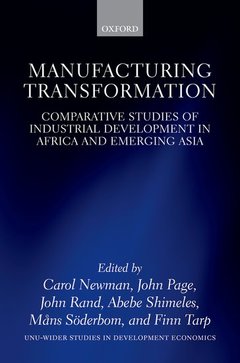Description
Manufacturing Transformation
Comparative Studies of Industrial Development in Africa and Emerging Asia
WIDER Studies in Development Economics Series
Coordinators: Newman Carol, Page John, Rand John, Shimeles Abebe, Söderbom Måns, Tarp Finn
Language: English
Subject for Manufacturing Transformation:
Publication date: 07-2016
324 p. · 16.3x23.4 cm · Hardback
324 p. · 16.3x23.4 cm · Hardback
Description
/li>Biography
/li>
While it is possible for economies to grow based on abundant land or natural resources, more often structural change-the shift of resources from low-productivity to high-productivity sectors-is the key driver of economic growth. Structural transformation is vital for Africa. The region's much-lauded growth turnaround since 1995 has been the result of making fewer economic policy mistakes, robust commodity prices, and new discoveries of natural resources. At the same time, Africa's economic structure has changed very little. Primary commodities and natural resources still account for the bulk of the region's exports. Industry is most often the leading driver of structural transformation. Africa's experience with industrialization over the past thirty years has been disappointing. In 2010, sub-Saharan Africa's average share of manufacturing value added in GDP was ten per cent, unchanged from the 1970s. Actually, the share of medium- and high-tech goods in manufacturing production has been falling since the mid-1990s. Per capita manufactured exports are less than ten per cent of the developing country average. Consequently, Africa's industrial transformation has yet to take place. This book presents results of comparative country-based research that sought to answer a seemingly simple but puzzling question: why is there so little industry in Africa? It brings together detailed country case studies of industrial policies and industrialization outcomes in eleven countries, conducted by teams of national researchers in partnership with international experts on industrial development. It provides the reader with the most comprehensive description and analysis available to date of the contemporary industrialization experience in low-income Africa. This is an open access title available under the terms of a CC BY-NC-SA 3.0 IGO licence. It is free to read at Oxford Scholarship Online and offered as a free PDF download from OUP and selected open access locations.
Carol Newman is Associate Professor at the Department of Economics, Trinity College Dublin and a non-resident Senior Research Fellow at UNU-WIDER. Her research is the microeconomics of development with a focus on both household and enterprise behaviour. She has published widely in the fields of development economics and agricultural economics, in particular in the area of enterprise dynamics and performance in developing countries. John Page is a Senior Fellow in the Global Economy and Development Program at the Brookings Institution and a Non-resident Senior Fellow of the World Institute for Development Economics Research (UNU-WIDER). He is also visiting professor at the National Graduate Institute for Policy Studies, Tokyo, Japan and a Research Associate of the Centre for the Study of African Economies at Oxford University. From 1980 to 2008 he was at the World Bank where his senior positions included: Director, Poverty Reduction, Director, Economic Policy, and Chief Economist, Africa. He is the author of several books and more than 100 published papers on economic development. John Rand is a professor of development economics at the University of Copenhagen. His research focus includes industrial policy and firm dynamics, quantitative impact evaluation of development projects, and macroeconomics of international capital flows. He has significant research experience through project involvement in Bangladesh, Cambodia, Egypt, Ethiopia, Ghana, Kenya, Mozambique Nicaragua, Rwanda, Senegal, Tanzania, Tunisia, Uganda, and Vietnam. He is co-editor of the European Journal of Development Research, member of the Steering Committee of the Joint MFS II Evaluations Programme in Holland, and since 2015, Deputy Director of the Development Economics Research Group (DERG), Department of Economics, University of Copenhagen. Abebe Shimeles received his postgraduate degrees in economics from Gothenburg University and the Delhi School of economics and a BA from Addis Ababa Universit
© 2024 LAVOISIER S.A.S.




